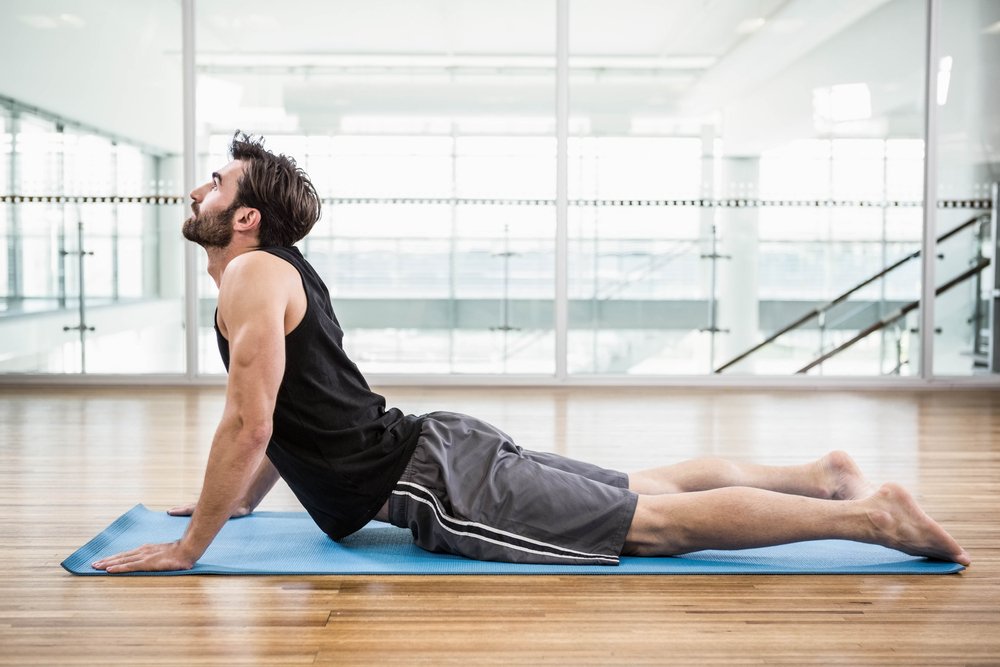How Pilates Changed My Life … and My MS, Part One: Take No Prisoner
Written by |


Editor’s note: This is the first of a three-part series about Pilates and MS.
When I was diagnosed with MS in December 2013, my most visible symptom was a waltzing shuffle that was slowly changing my once-purposeful gait into a wobble (leading some co-workers to believe I was drinking on the job). Like spring flowers, other symptoms blossomed soon enough. At the time, my doctors had prescribed physical therapy sessions. I tried very hard not to cry after driving home alone from one such session.
I would not describe myself as a fitness fanatic. But after I quit smoking in the mid-’90s, I had become addicted to the endorphin high from running, and the clarity and focus it fostered. Freelance writing often provides the perfect schedule for runners (write in the early morning, run around 11 a.m., come home, shower, eat and then work the rest of the day). I was very active, running, playing tennis, hiking and biking and — almost accidentally — staying fit.
But the physical therapy I was taking included a series of timed, or counted, exercises. Meaning it felt like I was being measured on how long it took before I could not complete the exercise. Inadvertently it emphasized to me what I no longer could do, reinforcing what I had lost and, worse, was losing, rather than reminding me of how much I had left.
Frustrated, I returned to my physiatrist, an energetic former gymnast who understood my need to remain physically engaged in life. Conventional physical therapy wasn’t the solution. “Why don’t you see if you can find a personal trainer who understands MS clients?” she asked. I couldn’t Google fast enough.
My search stalled pretty quickly; much of what I found were group sessions that emphasized general movement and mobility. I still had a great deal of capacity left, and didn’t feel I would get enough of a challenge from them. Then I found a Pilates instructor who was trained to work with clients who had MS, Parkinson’s disease and other neurologic issues.
And then my life — and my MS — took a turn for the better.
Joseph Pilates, the gentleman who created the resistance-based exercises, equipment and routines, was born in Germany in 1883. Small and sickly as a child and picked on by the bigger kids, Pilates became determined to overcome his disadvantages, and by the age of 14 was posing as a model for anatomy charts and made a living as professional boxer. Pilates was teaching self-defense to Scotland Yard police when World War I broke out, and he was imprisoned in England’s Isle of Man along with other German nationals as “enemy aliens.”
Determined to stay fit while in prison, Pilates fastened bed springs to the footboards and headboards of the prisoners’ beds and created resistance-based exercises so his fellow inmates also could stay more physically (and emotionally) fit. Pilates’ focus was strengthening users’ cores and balance as the foundation of strength and capacity — of critical importance to many with MS. These crude prototypes became the forerunners of the equipment used in contemporary Pilates around the world.
I continue to attend biweekly Pilates sessions with specially-trained instructors. Though there are innumerable routines, all require a sharp mental focus (not unlike golf, tennis, running, billiards, etc.). I have found Pilates to be extraordinarily challenging and physically rewarding. While it doesn’t provide an endorphin high, I frequently get lost in the pursuit of doing the exercises properly, which creates a very beneficial type of mindfulness, and for those 55 minutes I often forget that I have MS.
I didn’t know about Pilates’ imprisonment or the origin of the practice when I began, yet only in the weirdly-perfect way that MS is, it all makes sense now. MS is slowly imprisoning the physical me, as it keeps creating more challenges for how I physically move through my world and my life.
Besides taking Pilates instruction, I have created a home workout routine for emphasizing resistance so I can build strength and balance through it. Like Pilates, I’m trying to learn how to make this gradual imprisonment not just tolerable, but somehow amenable and perhaps in some ways, beneficial.
Chances are very good that I won’t be posing for an anatomy chart any time soon. After all, Pilates may be a great form of exercise, but it’s not a miracle worker. Yet there are moments during my sessions, and after on the drive home, when I feel really strong and fit and somehow just a little bit more free.
***
Note: Multiple Sclerosis News Today is strictly a news and information website about the disease. It does not provide medical advice, diagnosis, or treatment. This content is not intended to be a substitute for professional medical advice, diagnosis, or treatment. Always seek the advice of your physician or other qualified health provider with any questions you may have regarding a medical condition. Never disregard professional medical advice or delay in seeking it because of something you have read on this website. The opinions expressed in this column are not those of Multiple Sclerosis News Today, or its parent company, Bionews Services, and are intended to spark discussion about issues pertaining to multiple sclerosis.



Christine Noel
I share your feelings. Are you doing the reformer or mat Pilates or both? I enjoyed reading your article and I wish you the best.
Mike Knight
Hi Christine,
I do mat and reformer, as well as bio-cored, the Pilates chair (and a handful of other pieces of equipment like the Bosu ball, etc.). I am going to write about Mariska Breland next. Mariska took her first Pilates class in 1999, was diagnosed with MS in 2002 and has now led 44 Pilates for MS training courses (along with writing The Pilates for MS™ Textbook). I'm glad you enjoyed the article and wish you the best, too!
Dawn
Hello Mike, I also loved and enjoyed your story about Pilates. I had a similar experience with... although I was using PILATES in the mid 90’s as one of my training modules while I was training and preparing for my ballroom/Latin dance competition. I was very fortunate to have found a new Pilates instructor who’s mom had MS and she trained her several times every week! It truly is a perfect piece to the strengthening & flexibility puzzle required with this illness!
Mike Knight
Thanks so much, Dawn, I’m glad you enjoyed it. Pilates was and is a godsend to me and it sounds like you too (if only it was covered by insurance)!
Brenda
I too have MS and found pilates 7 years ago. I totally relate to your thoughts and love pilates also! Thanks
Mike Knight
Thanks so much...I'm glad Pilates is helping and that you enjoyed the article!
Gillian Greenwood
I teach Pilates to clients with MS. I have great results. As well as being an experienced Pilates teacher, I'm also a masseuse and I fu d the combination of both invaluable.
www.GillianGreenwood.com
Peggy
You wrote what I have been thinking the last 13 years....
I agree with it all and thank you for sharing.
Especially the part about forgetting the MS during class and concentrating so hard on what I am doing....it makes me forget I am working out. Most times I don't feel like going....but I am always so thankful that I did.
I have a wonderful teacher that offers MS mat classes and
Reformer classes.
Thanks for the great article!
Mike Knight
Thanks, Peggy, I'm glad the story resonated with you. So many times I don't want to go either (or exercise in general) but am always grateful when I do, too. Gotta keep moving.
tobie hall
I love you!!! :)
Mike Knight
Thanks SO much for introducing me to Pilates, I love you too!
Lotty
I was touched by your story. Your spirit and heart comes through so strong. I used to be a competitive runner until I got advanced arthritis is my hips a few years ago. Pilates was the only time I felt normal and forgot about pain. Last year I had a double hip replacement at the age of 43 - Pilates and yoga were my pre-Hab and rehab and are part of my life like trusted friends. I wish u all the best on your journey. Stay brave and bright.
Mike Knight
Thanks so much and thanks so much for reading the piece. It really has been a turning point for me and hopefully for others, too. All best to you, too...
LuAn
I, too, have found respite with Pilates. The MS Society funded our local Y to teach Pilates for MS patients. Only one certified instructor accepted the class, and went through Mariska Breland's training. Sadly, this instructor, is now stepping down from training for understandable reasons. I will now go into non-MS specific Pilates classes and ask the Y if they will waive the additional fees they require for the reformer classes. If they don't, I'll leave and seek out an instructor outside of the Y. I look forward to reading your next two articles on the topic.
Mike Knight
Thanks so much. It's pretty great that your local Y is/was so supportive. I worry sometimes about sounding too shrill about Pilates and MS, but "respite" is exactly right. MS doesn't appear to take a break (for me anyway) and forcing the issue through this type of "applied" mindfulness has been really powerful and effective. Thanks again and good luck!
Karen Higgins
I have had MS for 18yrs. I am wheelchair bound but trying to improve some of my weaker symptoms. This piece I have read has been inspiring. And, having MS, we all do need that inspiration so Thank You.
Mike Knight
You're sure welcome, Karen, and I'm glad this series has been inspirational! Pilates has certainly helped me find and realize some strength that I didn't know I had (physically and emotionally). In that way it continues to inspire me to keep trying to do it, keep working out (even when I don't want to, like today). I'm working on the final installment that may have some tips you'll find useful. Thanks so much!
Albert Arcuni
Where can I find a Pilates class for MA North Shore ( near Marblehead) folks. I'm 79 but still very noble, but don't have a structured workout program. Thx for any help you all can give me. Al
Mike Knight
Hi Al, and thanks so much for reading the column, I appreciate it! There are two routes I might suggest. Mariska's site (pilatesforms.com) lists all of the instructors she's trained, and you'll find that information here: http://pilatesforms.com/find-a-teacher/. When I first started looking for a Pilates instructor who worked with MS clients I Googled "Pilates+MS" and then added in where I live. I did that for North Andover and found this resource: http://www.oxygenfitness.net/aboutus/ (in Andover). This isn't an endorsement at all, but I did note that at least one instructor is trained to work with "special populations" including MS. I wouldn't be surprised if there aren't other instructors nearby too. Good luck and thanks again!